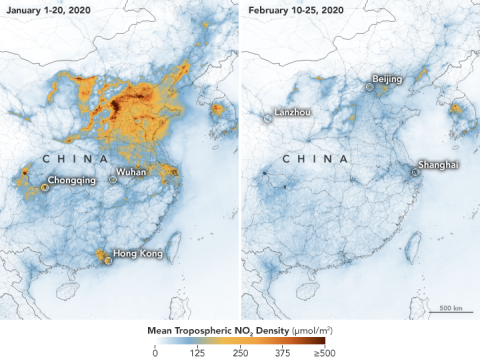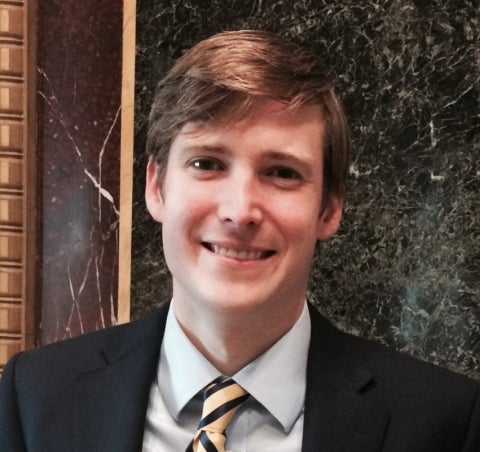Interviews / Q&As
Interviews / Q&As
Cities Aren’t Ready for Weather Extremes — No Matter What You Call Them
Xuhui Lee, a professor of meteorology at F&ES, says that it’s difficult to link climate change to two recent hurricanes that devastated parts of the U.S. and the Caribbean. But decades of scientific research do suggest that weather extremes such as Hurricanes Harvey and Irma will become more common — and cities will pay a steep price.Market Insights: Aligning China’s Energy Goals With the ‘Public Good’
Xizhou Zhou M.E.M. ’06 believes that the energy sector can help lift more of the world’s people out of poverty by providing heating, electricity, and the mobility that will provide access to a more connected world. He also sees the need for a robust regulatory system to reduce the environmental impacts associated with the energy sector. These impacts are immediatelyUnraveling Ecological Mysteries In a Vanishing American West
In an interview, new F&ES Prof. William Lauenroth discusses the challenges facing the western drylands, the changes he has observed during four decades of research, and strategies that could help protect remnants of a vanishing U.S. West.Will Politicization of COVID-19 Crisis Erode National Consensus On Response?
A new survey on public perceptions of the COVID-19 crisis found a national consensus that protecting public health should come ahead of opening the economy. But that dynamic could change quickly as the issue — like climate change — becomes increasingly politicized, Anthony Leiserowitz, director of the Yale Program on Climate Change Communications, says in an interview.‘We’re Talking About Our Future Leaders’ Conservation Fellow Opens Door to Students
Yale Conservationist Honored for Strides In Human-Centered Wildlife Protection
Over several years in Rwanda, Bill Weber developed a conservation strategy that has strengthened mountain gorilla populations by putting local people at the center of the effort. Weber, who has applied these principles in regions worldwide, was recently nominated for the prestigious Indianapolis Prize.Video: How Market Forces Can Help Protect the World's Forests
In an interview with The MacMillan Report, F&ES Professor Ben Cashore describes how market forces can help protect the world's forests.Yale Economist: Trump Order Unlikely To Alter Tightening U.S. Coal Market
President Trump today ifted a moratorium on the federal coal leasing program, predicting that it will create new jobs and reduce U.S. reliance on foreign energy sources. The order will do neither, predicts Kenneth Gillingham, a Yale economics professor who has published extensive research on the program.Lovejoy, ‘Godfather’ of Biodiversity, Reflects On 50 Years in the Amazon
Over the past five decades Thomas Lovejoy has helped bring global attention to the Amazonian rainforest and the threats it faces, leading seminal research that has become the foundation of the field of conservation biology — even coining the term “biological diversity.”‘This is Not a Normal Year’: Finding A Job in Difficult Economic Times
With nearly every sector worldwide affected by the COVID-19 crisis, Kevin Doyle offers advice for students looking to enter the job market at a difficult time and shares advice from alumni who launched their careers a decade ago during another time of economic crisis.The Complex Implications of COVID-19 on Global Energy Markets, Consumer Behaviors
 From January to February, NASA and European Space Agency pollution monitoring satellites detected significant decreases in nitrogen dioxide over China. The change was at least partly related to the economic slowdown following the outbreak of coronavirus.
The paralytic effect of the COVID-19 threat on human activities has triggered a steep decline in energy use worldwide, grounding airlines, keeping motorists off roadways, and grinding industry to a halt.
From January to February, NASA and European Space Agency pollution monitoring satellites detected significant decreases in nitrogen dioxide over China. The change was at least partly related to the economic slowdown following the outbreak of coronavirus.
The paralytic effect of the COVID-19 threat on human activities has triggered a steep decline in energy use worldwide, grounding airlines, keeping motorists off roadways, and grinding industry to a halt. Kenneth Gillingham
But while this monumental shift has had dramatic short-term environmental implications — including steep emissions reductions in some of the hardest-hit regions — the dire effects on global energy
Kenneth Gillingham
But while this monumental shift has had dramatic short-term environmental implications — including steep emissions reductions in some of the hardest-hit regions — the dire effects on global energyThe Benefits and Tradeoffs of Social Distancing
For more than a decade Eli Fenichel has studied the benefits and challenges of using social distancing in the face of an epidemic. In an interview, he discusses what that research revealed, how it is applicable to the current global crisis, and how the COVID-19 threat might strengthen future research and response to other global threats.Sustainable Procurement Key to Lowering Carbon Footprint
As more companies focus on reducing their carbon footprint, there’s one element that is key but often overlooked — reducing emissions from their supply chains.Supporting Research in the Tropics During the COVID Era
Each year the Tropical Resources Institute sends students across the world to conduct research in the world’s tropical regions. This year, of course, is not like most years.